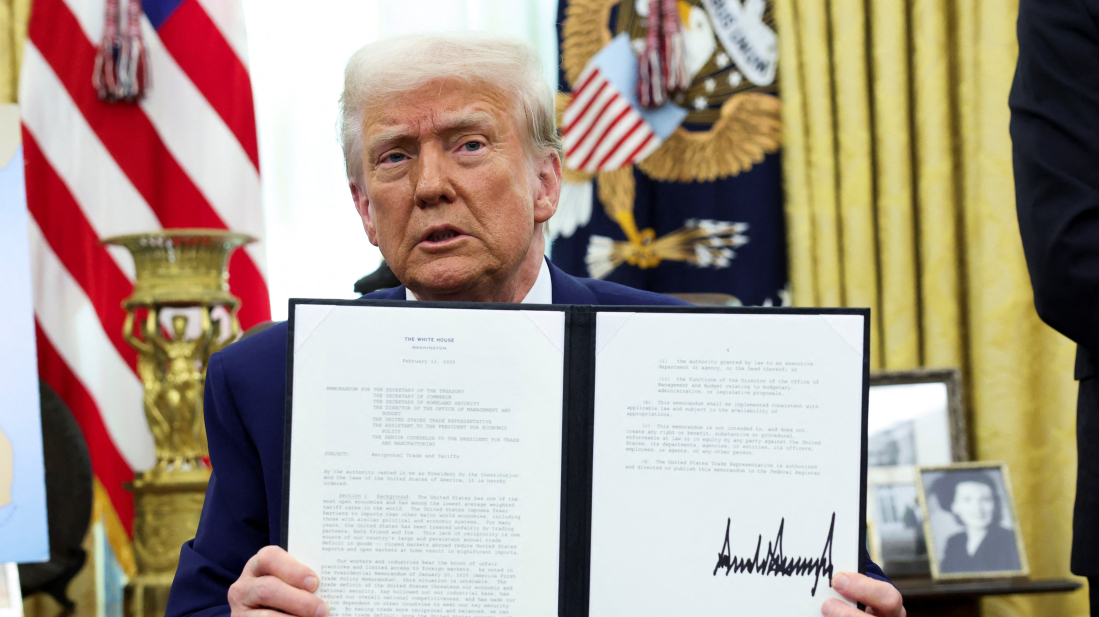Trump secures deal for 15% tariff on South Korean imports
The U.S. will impose a 15% tariff on imports from South Korea under a new trade deal that also includes a $350bn (about £264bn) South Korean investme...

U.S. President Donald Trump has directed his economic team to devise a reciprocal tariff plan, imposing matching duties on countries that charge tariffs on U.S. imports. The move, announced as part of Trump's broader trade policy overhaul, could escalate tensions with major global economies.
Trump signed a memorandum instructing officials to calculate reciprocal tariffs to counter existing duties and non-tariff barriers imposed on U.S. goods. While the order stops short of an immediate tariff hike, it launches an investigation into foreign trade policies that could take weeks or months to complete.
The White House strategy will initially focus on countries with the largest trade surpluses and highest tariff rates, including China, Japan, South Korea, and the European Union. Trump has also criticized India, citing its high tariffs on U.S. exports.
Markets reacted cautiously to the announcement, with Wall Street seeing modest gains, relieved that immediate tariffs were not enacted. However, analysts warn that the plan could fuel inflation and disrupt global supply chains.
Commerce Secretary nominee Howard Lutnick said the administration aims to finalize studies by April 1, coinciding with a deadline set for reducing U.S. trade deficits.
Trade experts note that implementing customized reciprocal tariffs poses a complex legal and logistical challenge. The White House is exploring various trade statutes, including Section 122 of the Trade Act of 1974, which allows for a temporary 15% tariff.
Trump has already imposed 10% tariffs on Chinese goods, steel and aluminum duties, and has placed a 30-day hold on tariffs for Canada and Mexico. Additional levies on cars, semiconductors, and pharmaceuticals are under consideration.
While the White House maintains that the policy aims to encourage trade negotiations, experts warn it could lead to retaliatory measures from U.S. allies and rivals, intensifying trade disputes.
The world’s biggest dance music festival faces an unexpected setback as a fire destroys its main stage, prompting a last-minute response from organisers determined to keep the party alive in Boom, Belgium.
Australian researchers have created a groundbreaking “biological AI” platform that could revolutionise drug discovery by rapidly evolving molecules within mammalian cells.
Australian researchers have pioneered a low-cost and scalable plasma-based method to produce ammonia gas directly from air, offering a green alternative to the traditional fossil fuel-dependent Haber-Bosch process.
A series of earthquakes have struck Guatemala on Tuesday afternoon, leading authorities to advise residents to evacuate from buildings as a precaution against possible aftershocks.
'Superman' continued to dominate the summer box office, pulling in another $57.25 million in its second weekend, as theatres welcome a wave of blockbuster competition following a challenging few years for the film industry.
The U.S. will impose a 15% tariff on imports from South Korea under a new trade deal that also includes a $350bn (about £264bn) South Korean investment in the U.S., President Donald Trump has announced.
U.S. President Donald Trump has announced sweeping 50% tariffs on Brazilian imports, citing concerns over judicial overreach and human rights violations. Yet major economic sectors were spared, following weeks of negotiations and lobbying from businesses on both sides.
An estimated 80,000 children are vulnerable to cholera in West and Central Africa amid ongoing outbreaks and the onset of heavy rains, according to the United Nations.
With just one day left until Donald Trump’s 1 August tariff deadline, the U.S. has announced trade deals with several countries, but many remain incomplete or lacking firm commitments.
U.S. Commerce Secretary Howard Lutnick confirmed that South Korea’s reciprocal and auto tariff rate will be set at 15%, averting a steeper 25% levy ahead of the 1 August deadline.
You can download the AnewZ application from Play Store and the App Store.

What is your opinion on this topic?
Leave the first comment